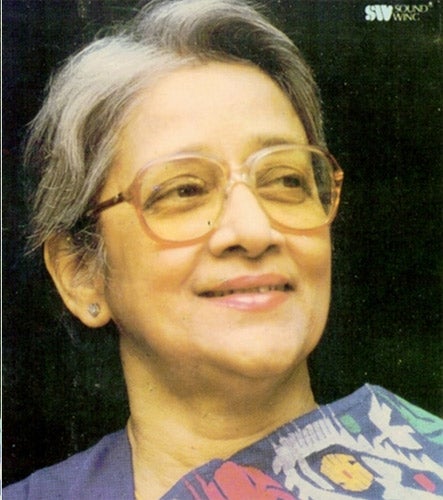Suchitra Mitra: Indian singer, composer and exponent of the work of Rabindranath Tagore

Suchitra Mitra's name will forever be bound up with that of Rabindranath Tagore, the great Bengali poet, playwright and musician who, in 1913, was the first non-European to win the Nobel prize for literature. Mitra would have had little quarrel with such pigeonholing; promoting and disseminating Tagore's words, music and dance were her life's passion. Many believe that Mitra's death, in the 150th anniversary year of Tagore's birth, marks the end of an era.
Mitra was born when her mother was on a train rattling through pre-partition Bengal, hence the vagueness of her birthplace. Her father, Sourindra Mohan Mukhopadhyay, knew the Tagore family, an Anglicisation of Thakur, from Jorasanko, north of Calcutta. The Tagores were torchbearers of the Bengali renaissance, a social, artistic and political reform movement during the 19th and early 20th centuries. It is no coincidence that Tagore penned two national anthems – those of India and Bangladesh.
Mitra grew up with the words and melodies of a uniquely Bengali song form – Rabindra sangeet – ringing in her head. "Rabindra song" is an eloquent, literary, light classical song-form named after its creator, Rabindranath Tagore, and rippled with allusions to classical, devotional and folk songs.
In 1941, she was awarded a scholarship to study at Sangeet Bhavan in Shantiniketan – Tagore's "abode of peace" – where she received tuition from the best. After graduation in 1945 she returned to Calcutta, and in that year her first 78rpm record of two Tagore songs came out.
In photographs Mitra peers out, bespectacled, looking professorial, accentuating an impression of intelligence and intensity but giving no forewarning of the passion and wit of the interpretations that you encounter on, say, the anthology Songs of Rabindranath (2004). Mitra declared, "Singing only the notes of Tagore's songs does not mean anything... the singer must understand the lyrics... He used tunes or created new beats as the rhythm of the poetry demanded."
While the vast body of her work focused on Tagore's songs and held it up for admiration, she also sang in films and sang playback, notably for the Bengali composer Salil Chowdhury from the late 1940s to the 1970s. Elsewhere, she acted and danced in Rabindra Nritya Natya ("Rabindra's dance drama") and performed in Tagore's plays. One notable Tagore-themed collaboration was Tribute to Tagore (1990) with the sarod (short-necked lute) maestro Amjad Ali Khan. Afterwards he affirmed that, for him, it was her deep knowledge of Tagore's art that opened the door to realising Tagore's genius. It was a profound irony that Mitra never met Tagore, and a source of regret her entire life that she began her studies 20 days after his death.
Ken Hunt
Suchitra Mitra, singer, composer and academic: born Central India Agency, British India 19 September 1924; married (one son, one daughter); died Calcutta, India 3 January 2011.
Subscribe to Independent Premium to bookmark this article
Want to bookmark your favourite articles and stories to read or reference later? Start your Independent Premium subscription today.

Join our commenting forum
Join thought-provoking conversations, follow other Independent readers and see their replies
Comments